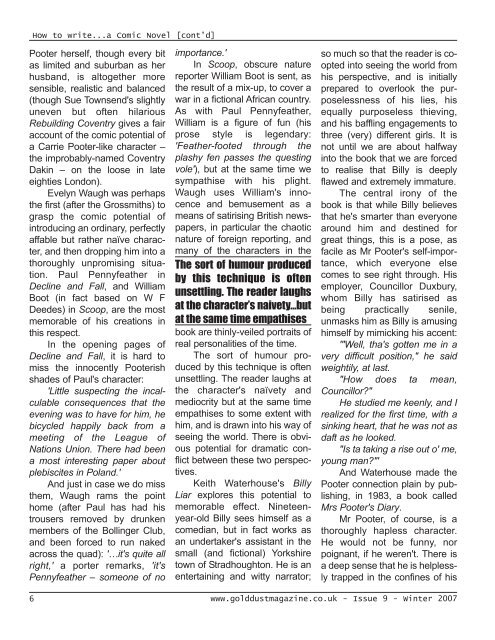Issue 9 - Gold Dust magazine
Issue 9 - Gold Dust magazine
Issue 9 - Gold Dust magazine
You also want an ePaper? Increase the reach of your titles
YUMPU automatically turns print PDFs into web optimized ePapers that Google loves.
How to write...a Comic Novel [cont’d]<br />
Pooter herself, though every bit<br />
as limited and suburban as her<br />
husband, is altogether more<br />
sensible, realistic and balanced<br />
(though Sue Townsend's slightly<br />
uneven but often hilarious<br />
Rebuilding Coventry gives a fair<br />
account of the comic potential of<br />
a Carrie Pooter-like character –<br />
the improbably-named Coventry<br />
Dakin – on the loose in late<br />
eighties London).<br />
Evelyn Waugh was perhaps<br />
the first (after the Grossmiths) to<br />
grasp the comic potential of<br />
introducing an ordinary, perfectly<br />
affable but rather naïve character,<br />
and then dropping him into a<br />
thoroughly unpromising situation.<br />
Paul Pennyfeather in<br />
Decline and Fall, and William<br />
Boot (in fact based on W F<br />
Deedes) in Scoop, are the most<br />
memorable of his creations in<br />
this respect.<br />
In the opening pages of<br />
Decline and Fall, it is hard to<br />
miss the innocently Pooterish<br />
shades of Paul's character:<br />
'Little suspecting the incalculable<br />
consequences that the<br />
evening was to have for him, he<br />
bicycled happily back from a<br />
meeting of the League of<br />
Nations Union. There had been<br />
a most interesting paper about<br />
plebiscites in Poland.'<br />
And just in case we do miss<br />
them, Waugh rams the point<br />
home (after Paul has had his<br />
trousers removed by drunken<br />
members of the Bollinger Club,<br />
and been forced to run naked<br />
across the quad): '…it's quite all<br />
right,' a porter remarks, 'it's<br />
Pennyfeather – someone of no<br />
importance.'<br />
In Scoop, obscure nature<br />
reporter William Boot is sent, as<br />
the result of a mix-up, to cover a<br />
war in a fictional African country.<br />
As with Paul Pennyfeather,<br />
William is a figure of fun (his<br />
prose style is legendary:<br />
'Feather-footed through the<br />
plashy fen passes the questing<br />
vole'), but at the same time we<br />
sympathise with his plight.<br />
Waugh uses William's innocence<br />
and bemusement as a<br />
means of satirising British newspapers,<br />
in particular the chaotic<br />
nature of foreign reporting, and<br />
many of the characters in the<br />
The sort of humour produced<br />
by this technique is often<br />
unsettling. The reader laughs<br />
at the character’s naivety...but<br />
at the same time empathises<br />
book are thinly-veiled portraits of<br />
real personalities of the time.<br />
The sort of humour produced<br />
by this technique is often<br />
unsettling. The reader laughs at<br />
the character's naïvety and<br />
mediocrity but at the same time<br />
empathises to some extent with<br />
him, and is drawn into his way of<br />
seeing the world. There is obvious<br />
potential for dramatic conflict<br />
between these two perspectives.<br />
Keith Waterhouse's Billy<br />
Liar explores this potential to<br />
memorable effect. Nineteenyear-old<br />
Billy sees himself as a<br />
comedian, but in fact works as<br />
an undertaker's assistant in the<br />
small (and fictional) Yorkshire<br />
town of Stradhoughton. He is an<br />
entertaining and witty narrator;<br />
so much so that the reader is coopted<br />
into seeing the world from<br />
his perspective, and is initially<br />
prepared to overlook the purposelessness<br />
of his lies, his<br />
equally purposeless thieving,<br />
and his baffling engagements to<br />
three (very) different girls. It is<br />
not until we are about halfway<br />
into the book that we are forced<br />
to realise that Billy is deeply<br />
flawed and extremely immature.<br />
The central irony of the<br />
book is that while Billy believes<br />
that he's smarter than everyone<br />
around him and destined for<br />
great things, this is a pose, as<br />
facile as Mr Pooter's self-importance,<br />
which everyone else<br />
comes to see right through. His<br />
employer, Councillor Duxbury,<br />
whom Billy has satirised as<br />
being practically senile,<br />
unmasks him as Billy is amusing<br />
himself by mimicking his accent:<br />
'"Well, tha's gotten me in a<br />
very difficult position," he said<br />
weightily, at last.<br />
"How does ta mean,<br />
Councillor?"<br />
He studied me keenly, and I<br />
realized for the first time, with a<br />
sinking heart, that he was not as<br />
daft as he looked.<br />
"Is ta taking a rise out o' me,<br />
young man?"'<br />
And Waterhouse made the<br />
Pooter connection plain by publishing,<br />
in 1983, a book called<br />
Mrs Pooter's Diary.<br />
Mr Pooter, of course, is a<br />
thoroughly hapless character.<br />
He would not be funny, nor<br />
poignant, if he weren't. There is<br />
a deep sense that he is helplessly<br />
trapped in the confines of his<br />
6 www.golddust<strong>magazine</strong>.co.uk - <strong>Issue</strong> 9 - Winter 2007


